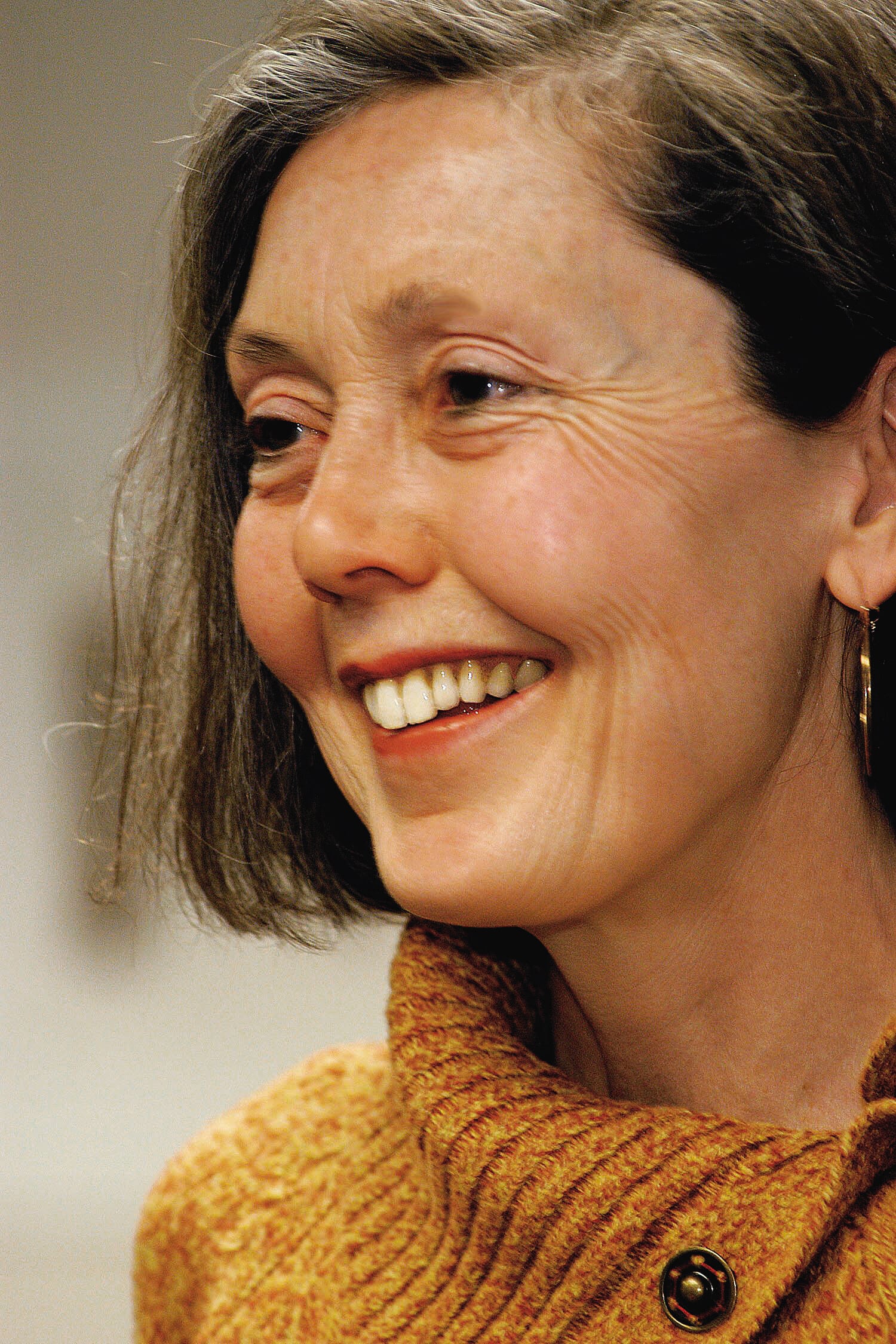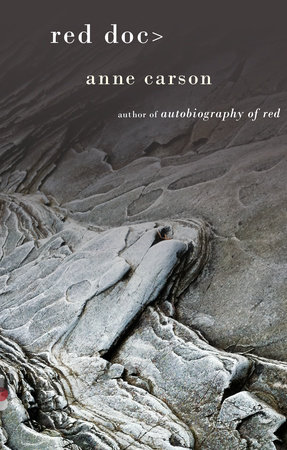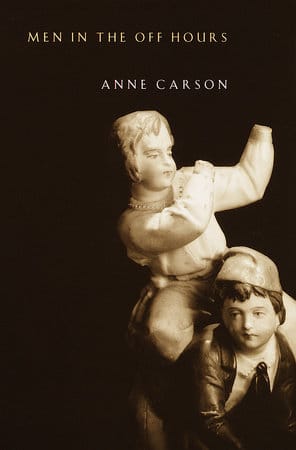
Anne Carson was born in Canada and has been a professor of Classics for over 30 years. She was twice a finalist for the National Book Critics Circle Award; was honored with the 1996 Lannan Award and the 1997 Pushcart Prize, both for poetry; and was named a MacArthur Fellow in 2000. In 2001 she received the T.S. Eliot Prize for Poetry – the first woman to do so, the 2001 Griffin Poetry Prize and the Los Angeles Times Book Prize. She currently teaches at the University of Michigan and lives in Ann Arbor.
In 2020, Anne Carson was awarded Spain’s prestigious Princess of Asturias Award for Literature. The jury of the literature award — one of the eight handed out annually by a foundation named after the heir to the Spanish throne, said that Carson “has reached a level of intensity and intellectual solvency that place her among the most outstanding writers of the present” (as reported by CBC News.)


- 2014
- 2001
Judges’ Citation
Anne Carson continues to redefine what a book of poetry can be….
Anne Carson continues to redefine what a book of poetry can be; this ambitious collection ranges from quatrains studded with uncanny images (‘Here lies the refugee breather/who drank a bowl of elsewhere’) to musing verse essays, personal laments, rigorous classical scholarship, and meditations on artists’ lives, caught in the carnage of history. All are burnished by Carson’s dialectical imagination, and her quizzical, stricken moral sense.
Judges’ Citation
Red Doc>, Anne Carson’s return to the characters of Autobiography of Red, stands on its own columns with pedestals in the fragments of Stesichorus’s account of Herakles’ final labor – to steal the red cattle of the monster Geryon.
Red Doc>, Anne Carson’s return to the characters of Autobiography of Red, stands on its own columns with pedestals in the fragments of Stesichorus’s account of Herakles’ final labor – to steal the red cattle of the monster Geryon. The narration puts the gaps to task. What is taken up again, more significantly than an update of Autobiography, is a daunting writer having her particular way with the language. Amid marvels of toaster-sized ice bats, barn-sized crows, and a silver-tuxedoed Hermes in humanlike form, is a dying mother’s request of the daughter to pluck the hairs from her chin. Geryon returns middle-aged, Herakles, a damaged war veteran. Sexual bent is irrelevant; nature outsized, glacial and volcanic. Words are rescued, morphed and slapped awake. Speech hurtles from vulgar to sublime. Everything accelerates except when a break is introduced disguised as riff, list or song and the mead is served in golden cups.
Selected poems
by Anne Carson
|
YOU SPELL IT number 4 letter N O no space all caps: 4NO / is it a nickname / no Babycakes it’s functional the fucking army being a fucking fulcrum of fucking functionality / they called you 4NO in the army / are you going to repeat everything I say / sorry / pass the sugar / so you knew Sad in the army / indeed I did / he says you can see the future you’re a prophet / no I see Seeing I am the god of this I see Seeing coming / what’s that like / all white all the time / what do you mean / I mean the whole immediate Visible crushed onto the frontal cortex is nothing but white without any Remainder now you’ll say of course there’s no Remainder if a thing hasn’t happened yet! but the fact is most of what you people see most of what you people call the present world is just Remainder just a failure of Invisibility’s flames to disappear from that thin edge / a failure / they were always cming up to me saying 4NO who’ll win the hockey pool 4NO your name means Foresight better get some 4NO you’re the god who knows the future how come you got yourself fuckstuck in this meatclock didn’t you see it coming / well didn’t you / what I saw coming was the atomic essence of the Visible brought to such density its Incandescence left no place for anyfuckingthing else / ah / or am I talking outside your experiential zipcode / sort of / give me that sugar again / so this white stuff’s coming at you all the time / yup / you can’t stop it / I can slow it down with alcohol or pharmaceuticals I choose not to / was it different in the army / hell yes we were drugged to the eyeballs / Sad doesn’t talk about that much / no I bet not / well he mentioned something at a crossroads / say again / a crossroads a woman a shopping bag a white plastic bag I don’t know / here’s some advice / yes / don’t ask about the woman don’t ask about the crossroads don’t ask about the plastic shopping bag / okay / don’t ask him don’t ask me / okay / time for my meds I’ll leave you now / it was a pleasure / oh I doubt that |
Copyright © 2013 by Anne Carson
4NO
Little clicks all night in the back lane there blackness
Goes leaking out the key.
“It twindles,” said Father to April on her
Anvil of deep decree.
Copyright © 2000 Anne Carson
Epitaph: Thaw
Murderous little world once our objects had gazes. Our lives
Were fragile, the wind
Could dash them away. Here lies the refugee breather
Who drank a bowl of elsewhere.
Copyright © 2000 by Anne Carson, Men in the Off Hours, Alfred A. Knopf
Epitaph: Zion
Now it hangs on the back of the kitchen chair
where I always sit, as it did
on the back of the kitchen chair where he always sat.
I put it on whenever I come in,
as he did, stamping
the snow from his boots.
I put it on and sit in the dark.
He would not have done this.
Coldness comes paring down from the moonbone in the sky.
His laws were a secret.
But I remember the moment at which I knew
he was going mad inside his laws.
He was standing at the turn of the driveway when I arrived.
He had on the blue cardigan with the buttons done up all the way to the top.
Not only because it was a hot July afternoon
but the look on his face —
as a small child who has been dressed by some aunt early in the morning
for a long trip
on cold trains and windy platforms
will sit very straight at the edge of his seat
while the shadows like long fingers
over the haystacks that sweep past
keep shocking him
because he is riding backwards.
Copyright © 2000 by Anne Carson
Father’s Old Blue Cardigan
I AM VERY he says tilting into the room and stops. Happy
| to see you man but I’m not
sure you’re real. Tell me you’re real. 4NO looks at him upside down then unfolds from his headstand. Bad night? says 4NO. But Sad is straying about the room touching all the chairs one by one. Chairs he says. I missed you. His voice is soft. His eyes drift off. 4NO watches him fragilely. Every molecule of Sad and Sad’s bad future is advancing through 4NO’s retinal surface. Like perfect works of art they form a sparkling flood. They saturate him and confiscate the present moment. He closes his eyes against this unbearable excess and gathers his mind to a point. It breaks through the white. He opens his eyes. At ease soldier he says to Sad. Nobody’s here yet. I’m just stretching. Sad smiles and then forgets not to. The smile stays on his face. |
Copyright © 2013 by Anne Carson
I AM VERY
A New Year’s white morning of hard new ice.
High on the frozen branches I saw a squirrel jump and skid.
Is this scary? he seemed to say and glanced
down at me, clutching his branch as it bobbed
in stiff recoil – or is it just that everything sounds wrong today?
The branches
clinked.
He wiped his small cold lips with one hand.
Do you fear the same things as
I fear? I countered, looking up.
His empire of branches slid against the air.
The night of hooks?
The man blade left open on the stair?
Not enough spin on it, said my true love
when he left in our fifth year.
The squirrel bounced down a branch
and caught a peg of tears.
The way to hold on is
afterwords
so
clear.
Copyright © 2000 by Anne Carson
New Rule
| TIME PASSES TIME
does not pass. Time all but passes. Time usually passes. Time passing and gazing. Time has no gaze. Time as perseverance. Time as hunger. Time in a natural way. Time when you were six the day a mountain. Mountain time. Time I don’t remember. Time for a dog in an alley caught in the beam of your flashlight. Time not a video. Time as paper folded to look like a mountain. Time smeared under the eyes of the miners as they rattle down into the mine. Time if you are bankrupt. Time if you are Prometheus. Time if you are all the little tubes on the roots of a gorse plant sucking greenish black moistures up into new scribbled continents. Time it takes for the postal clerk to apply her lipstick at the back of the post office before the supervisor returns. Time it takes for a cow to tip over. Time in jail. Time as overcoats in a closet. Time for a herd of turkeys skidding and surprised on ice. All the time that has soaked into the walls here. Time between the little clicks. Time compared to the wild fantastic silence of the stars. Time for the man at the bus stop standing on one leg to tie his shoe. Time taking Night by the hand and trotting off down the road. Time passes oh boy. Time got the jump on me yes it did. |
Copyright © 2013 by Anne Carson